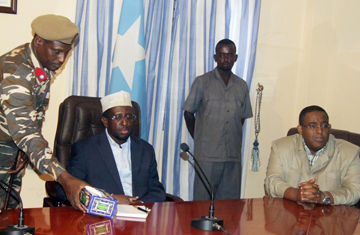
Somali president Sheik Sharif Sheik Ahmed, second left, sits with Somali prime minister Omar Abdirashid Sharmarke, right, during a news conference in Mogadishu's presidential palace, Somalia,Tuesday,Sept. 21,2010.
When Somalia's President Sheikh Sharif Ahmed took office in January 2009, hopes were high that here, finally, was the man who might stand a chance of pulling his country from the ruin it had fallen into after 20 years of near-perpetual war.
A former member of Somalia's main Islamic political group, Sharif supposedly had good enough contacts to start reconciling with armed Islamic hardliners. He was also hailed as a man of integrity who could rise above the corruption, petty squabbles and clan politics that had turned Somalia's Transitional Federal Government (TFG) — which he would now lead — into a laughingstock.
But whatever hopes there were that Sharif's administration would turn things around were dashed on Tuesday when his prime minister, Omar Abdirashid Sharmarke, resigned under pressure, in the culmination of a political battle that had dragged on for several months. That two leaders could clash so intensely when their government controls an area only the size of a few football fields and offers no services to Somalia's people might seem funny if it were not so awful, and so typical of the Somali leaders who have come before them.
Foreign diplomats, experts and Somalis themselves say that whatever faith anyone had in the TFG as an institution is now spent, and many predict its imminent collapse. These days, Somalis in Mogadishu see very little difference between the government and the main insurgent groups. "Everybody is giving up on TFG," Bronwyn Bruton, author of a special report on Somalia for the Council on Foreign Relations, tells TIME. "I don't think anybody is taking them seriously. Honestly if you look down the road three or four months, it does not look good."
Founded in 2004, the Transitional Federal Government was meant to be a bridge to a more permanent government once peace was restored to Somalia. The deadline for that to happen was 2011, when Somalia is also supposed to adopt a new constitution. But instead of doing what they can to govern their country, Somalia's leaders have always seemed more interested in playing games and one-upping each other.
Somalia's current leaders say the looming deadline was the reason for Sharif's getting rid of Sharmarke. "The president felt that the government was not performing to the maximum," Sharif's spokesman Abdirashid Hashi tells TIME, in what could be the understatement of the millennium. "He wanted a leaner, more effective cabinet, so there was a feeling that it was better to reform the system and move forward."
Indeed there is quite a lot of flab in Somalia's government, which has, among its 40 or so Cabinet members, one who oversees the Ministry for Tourism and Wildlife — even though the country, on the brink of war and where foreigners are considered prime targets for hostage taking, isn't exactly a tourist hotspot.
Despite international backing and the presence of African Union troops, the TFG has proven totally incapable of making life any better for Somalis, and in fact has seen its power steadily erode as insurgent group al-Shabaab has gained strength. The group has recently carried out a string of successful and deadly attacks, culminating with the storming of a Mogadishu hotel in late August that killed at least 30 people.
